#medical dictation services
Explore tagged Tumblr posts
Text
How Hybrid Dictation Systems for Doctors Give Best of Both Worlds
Summary: Creating hybrid dictation systems for doctors to follow offers the best of both worlds: an easy way to update recurring patient info with a click of the button while allowing physicians to dictate longer, fuller notes when necessary.
Technology can be a double-edged sword. Often, when it improves one area of our lives, it can make another more difficult. Patient record management is a great example. For years, doctors simply dictated all their patient encounter notes and other documentation. That changed when electronic medical records, or EMRs, came along. EMRs are a great way to store and transfer data, but getting that information into the system in the first place isn’t always easy…

The Birth of Hybrid Dictation Systems for Doctors
The concept of medical dictation caught on very early with medical professionals. In fact, medical transcription dates back to at least 1,600 BC. It proved to be a useful multi-tasking tool, allowing the clinician to focus on the patient while someone else took on the chore of documenting the patient encounter.
EMRs changed the way physicians and clinicians managed documentation. The transition wasn’t so straightforward; for many, it certainly wasn’t smooth. Interfaces were counter-intuitive, tasks became repetitive, and systems seemed designed more for administrators than clinicians. This frustrating mix made documenting patient encounters more difficult and more time-consuming – the exact opposite of what they were intended to do.
This lack of user-friendliness for entering longer notes is part of the reason why doctors started creating hybrid dictation systems for themselves. The idea was to blend traditional dictation with direct EMR editing/updating.
The interesting thing is that some EMR updating is relatively easy. For example, clicking on checkboxes for yes/no answers is fast and straightforward. Where it gets difficult is when longer, fuller notes are necessary. These include in-depth observations, referral notes for specialists, and complex treatment plans. Not all doctors are born typists – hunting and pecking these notes seriously takes away from patient interaction. Even those comfortable with a keyboard notice the same issue of lack of face-to-face time with their patients.
A personalized hybrid dictation system for doctors provides the best of both worlds. He or she can quickly click the boxes directly in the EMR when it’s easy to do so and dictate notes for longer passages. This flexibility makes patient record management much faster, easier, and less stressful.
The Added Bonuses of Hybrid Dictation Systems
Hybrid dictation systems for doctors promote more patient interaction – including in ways you may not have thought of. Speaking your observations and treatment plans:
Reinforces the information for patients, leading to better compliance
Allows the patient to correct you if you have misinterpreted some information or remind you of something you forgot to add
Opens the floor to more discussions when your verbal notes trigger a question in the patient
Means you are less likely to miss important details
So not only do you improve the amount of time you’re spending face-to-face with your patient, the quality of your patient encounter improves, too.
You’ll also see improvements in other areas of your practice:
Less time updating patient records
Less (or no) overtime spent in the evenings and on the weekends with patient documentation
Less burnout that comes with documentation responsibilities
Better work/life balance
Better job fulfillment
Contact iMedat to Find Out How Easy Setting Up Your Hybrid Dictation System Can Be
Every physician and clinician is different, and each requires a different approach to EMR management. iMedat can help you create the hybrid dictation system that works best for you and your workflows. Contact us for a no-obligation introductory meeting, and we will show you how you can integrate dictation back into patient record management your way. Fill out our email form here or call 888-779-5888.
Blog is originally published at: https://imedat.com/hybrid-dictation-systems-doctors/
It is republished with the permission from the author.
#hybrid dictation systems for doctors#dictation service#dictation services#transcription#medical transcription service
0 notes
Text
Walk Dates
Requested Here!
Pairing: Tim Bradford x fem!reader (+ Kojo and r's service dog)
Summary: You and your service dog meet Tim and Kojo during a walk. The dogs force you and Tim to keep meeting, but neither of you mind. When you're late for a walk because of an emergency, Tim decides he would like to be more than walk-buddies.
Warnings: r has a service dog for unspecified reasons, r passes out and goes to the hospital, mostly fluff! unplanned Shania Twain reference
Word Count: 2.8k+ words
Masterlist | Tim Bradford Masterlist | Request Info/Fandom List
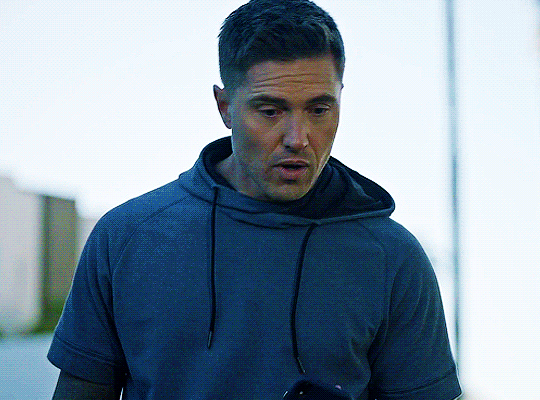
“Match my shoes or complement?” you ask your dog.
She barks once and raises her left paw to point to the grey booties you’re holding. You nod and put the other pair away before kneeling before her. She raises one foot at a time so you can put her shoes on to protect her paws from the concrete outside. Your doctor told you going on walks could be beneficial for your mental and physical health, and your service dog seems to enjoy them just as much as you do.
“Ready to walk?” you ask as you stand.
Rather than barking to answer, she runs to the end cabinet in your kitchen and sits. Her leash and your small medical bag are inside, and you shake your head in amusement. Once your bag is on your back and her leash is clipped to her harness, you exit the back door and lock it behind you.
“Let’s go, girl.”

Tim sighs as he shifts his truck into park. His shift was hectic, but he knows Kojo has been trapped inside and would like a walk. The weather is nice today, so it would do Tim some good to get outside too, he thinks.
As Tim suspected, Kojo is bouncing excitedly and full of energy when he enters. Kojo runs to the shelf holding his harness and leash, then back to Tim. “I know, I know. Let’s do it, buddy,” Tim tells Kojo.
They leave a few minutes later, and Tim takes a deep breath as Kojo leads the way. The neighborhood isn’t busy this time of day, so Tim can relax a bit and follow Kojo rather than dictate where they go while actively looking for any threats.

Your service dog stops when another dog barks happily. You look away from the butterfly you were watching and smile when you see a man walking a dog. His dog seems interested in meeting your dog, and you click your tongue to signal her to keep walking.
“Kojo, no,” the man says, pulling the leash tight to his side.
“Hello,” you greet kindly.
“Hi,” the man replies, dipping his head in greeting. “Kojo.”
“Beautiful dog,” you add.
“He thinks that means he can do whatever he wants. Sorry, he likes meeting other dogs.”
“He’s fine,” you promise.
“She’s working, Kojo,” he whispers harshly.
“He can come over,” you offer. “She’s sweet, and she can multitask.”
“Are you sure?”
“Positive.”
The man loosens his grip on the leash and steps toward you. Your dog wags her tail quickly, slapping your leg every time she does. She sits, and Kojo flops down as they introduce themselves as dogs do.
You extend your right hand and tell the man your name and your dog’s name.
“I’m Tim, and that’s Kojo,” he replies. “We usually have more manners.”
Your dog steps over Kojo’s back legs to stand over him, and you chuckle as you say, “We don’t.”
“I haven’t seen you over here before.”
“Our walk times differ daily,” you explain. “I should start coming out now, though, because there’s no one else.”
“That’s why we love it.”
Your dog stands quickly and presses her nose into your thigh. Time to go home. “That’s my cue,” you tell Tim. “Maybe we’ll see you and Kojo on another walk soon.”
“That’d be nice. Enjoy the rest of your day,” Tim agrees. You smile as your dog leads you back the way you came. Tim is nice, his dog is adorable, and they exude comfort. You truly wouldn’t mind running into him again, you decide.
As you leave, Tim watches you go, and Kojo does too. Kojo looks up at Tim and pants happily.
“Good boy, Kojo,” Tim compliments. “But we need to talk about your manners. Service dogs can’t always hang out, bud.”
Kojo tilts his head as his ears perk, and Tim shrugs. He doesn’t know why you have a service dog, but it doesn’t matter. You do.
“We’re both going to be thinking about them for a while aren’t we?”
Kojo barks in return, and Tim sighs. There are worse things to think of.

Tim falls asleep thinking of you and wakes with a smile on his face. Kojo jumps onto his bed with his leash in his mouth, and Tim assumes he’s thinking about you and your dog, too. When Angela and Lucy started joking that Tim and Kojo were exactly the same, just different species, he didn’t expect to prove them right so easily.
“Fine, fine,” Tim concedes when Kojo moves to stand on his chest. “A quick walk before work. They won’t be there, though.”
Tim shakes his head as Kojo leads him to the same stretch of sidewalk where they met you last night. You’re nowhere to be seen, as expected, but Kojo keeps walking.
“Good morning, Kojo.”
Tim looks up quickly when he hears your voice, and your smile is stronger than any coffee he’s ever tried. He returns your smile and steps closer. Kojo greets your dog happily, and they step into the grass-covered yard beside you.
“Good morning to you, too, Tim,” you add.
“Good morning. Didn’t expect to see you so soon.”
“This one couldn’t stop thinking about Kojo,” you explain, pointing to your dog. “And my doctor wants me to walk more, so win-win.”
“They’re best friends now, aren’t they?” Tim asks.
You turn at the same time as him, and your arm presses against his as you watch your dogs play together.
“They certainly are. Do you think they’ll keep waking us up to see each other?”
“Kojo will.”
“She will, too.”
“Well, I have to get to work, but it was great seeing you. Kojo appreciates your early morning walk.”
“What do you do?” You scrunch your nose and add, “Sorry, if that’s too personal you don’t have to answer.”
“Not at all,” Tim assures. “I’m a cop.”
“I knew it,” you reply.
“What about you?”
You give him a quick overview of what you do but leave out the part where sometimes your dog won’t let you. She does her job a bit too well sometimes and she’s already pulled you away from Tim once.
“Have a good day at work, Tim,” you say. “See you around.”
“You, too.”

Over the next week, you and Tim meet on walks once or twice a day. Your dog seems attuned to Kojo’s schedule and leads you to Tim every time you go for a walk. Within a week, you and Tim decide to walk together rather than stand in one place and interrupt your walks.
“I- this may be too forward,” Tim begins as you walk beside him.
“May not be,” you counter.
“Would you want to exchange numbers? It could be easier to let these two partners in crime meet up if we can talk before,” he suggests.
“Don’t call them partners in crime! Then you’d have to arrest them.”
“I’m sure they’d get off with a warning.”
“Tim!” You chuckle before agreeing to exchange numbers.
When your fingers brush Tim’s as you hand him your phone, you suddenly understand why your dog wants to see him and Kojo every day. You could get used to life at his side.
“I tried to leave last night to run to the store, but Kojo wouldn’t let me pass his leash,” Tim tells you as he returns your phone. “Had to take him for a walk before I could go get dinner.”
“Is he that convincing?” you inquire.
“He’s that bossy.”
“I wonder if he gets it from you,” you muse playfully.
“His former owner. Friend of mine from work, so I can blame that on her.”
“But all of his good traits are from you?” you guess.
Tim shrugs with a smile, and you bump your shoulder against his. These walks are doing you more good than your doctor anticipated. Your dog hasn’t alerted you to any health-related threats in days, which you attribute directly to walking with Tim and Kojo.
“Tim…” could we be more than neighbors who walk their dogs together?
Tim says your name, matching your tone as you return to your starting place.
“I just wanted to ask if we could meet again tonight. For another walk, to wear them out before bed?” you suggest, rather than saying what you want to.
“Text me the time.”
You nod and return home with a smile on your face. Though you have plenty you could do, you waste most of the day staring at the clock and looking forward to meeting Tim and Kojo again.

The leash hangs limply from your hand after you retrieve it from the cabinet. Your health took a sudden dip about an hour ago, but you’re trying to stay strong enough for the walk. Paws thud on the floor behind you, and when she presses her snout firmly into your thigh, you lower your hand toward her head.
“I know,” you mumble weakly. “I know, girl. But we can walk, right?”
She barks before she tugs on your shirt with her teeth. You shake your head, and she wraps a paw around your calf. Despite your need to see Tim, you know she’s right, and you carefully lower to the floor. As soon as you sit, your dog licks your cheek and presses her nose to your chest, but her whines are muffled as your eyes flutter closed.

Tim has never been more excited to walk Kojo than he is today. He had a rough day at work, so he doesn’t hesitate to take Kojo out as soon as he arrives home. They get to your meeting spot early and wait. As your suggested time comes and goes, Kojo gets antsy. Tim pulls his phone from his pocket, but he doesn’t have any messages from you. He sends you one, but it goes unread until he turns the screen off.
Kojo starts pulling on his leash a few minutes later. His nose is lowered to the ground, so Tim gives him some slack in his leash. Kojo walks through your usual route but passes the place where you and Tim part ways. He stops in front of a house several blocks from Tim’s and looks at the yard before he leads Tim to the door.
“What are you doing, Kojo?” Tim asks.
A dog barks inside, and as the barking continues, growing louder as the dog nears the door, Tim recognizes the sound of the bark. It’s your dog. She scratches against the door and whines, and Tim realizes that if you’re late and your service dog is upset in your house, something happened to you.
He leads Kojo off the porch and calls for an ambulance as he rounds the house. The side door is unlocked, and as Kojo steps inside, Tim sees your hand against the floor, with a leash beside it. Tim pushes the door open quickly and barely manages to catch it before it breaks the window behind it. Tim drops Kojo’s leash, and Kojo lies beside your legs to provide comfort to you and himself. Tim has known for over a week that Kojo loves you but seeing you like this makes Tim question how he feels about you.
Tim says your name but gets no answer. “Hey, girl,” he tells your dog instead. “What do I need to do? Show me.”
She presses her nose against your pulse point, and Tim follows suit on the other side. Your heart rate is elevated, and your slumped position is likely making it hard to breathe. Tim gently moves you into a more comfortable position as Kojo moves with you.
Your dog moves away from you and pulls a cabinet open before dragging a small backpack to Tim. He unzips it and sees medication, water with minerals and electrolytes, and a small booklet with instructions on what to do in case something like this happens.
Tim lays the book open and begins working through the recommended actions. In his mind, he pleads with you – begs you – to come back to him. He can hear the sirens on the ambulance approaching when you finally blink your eyes open.
“Tim?” you ask softly. “What are you doing here?”
“You didn’t meet us on the walk,” he answers. “Kojo got worried.”
“Just Kojo?” you ask knowingly, brushing a thumb over the crease between Tim’s eyebrows.
“Ambulance is here,” Tim tells you. “You’re gonna be okay.”
You see your bag beside him and whisper to thank him. “Sorry, I missed our walk.”
“You’ll have to make it up to me when you feel better,” he replies.
His hand slips into yours as you and your dog are taken to the ambulance. He asks the EMTs which hospital they’re taking you to before he kisses your temple and heads back into your house to clean up the mess he made. The deep scratches on your front door will have to wait, but he was nearly as upset as your dog when he got inside. Kojo whines at the door with his leash dragging behind him, but Tim says, “We have to wait. She’ll call when she’s ready.”

The moment you get discharged, you call Tim. He agrees to pick you up before you even ask, and he and Kojo are waiting for you in the lobby when you’re pushed out of the elevator in a wheelchair.
“You can still walk, right?” Tim checks.
“Yes,” you promise. “And I’ll need lots of walks to feel better.”
Tim frowns, and you rush to tell him that you’re teasing. You feel much better, thanks to him, and the doctors said he helped you properly and with plenty of time to spare.
“They think I should keep you around,” you add quietly.
“Kojo would happily become your second service dog,” Tim replies.
“Thank you, Tim,” you say as he helps you into his truck. “For everything.”
He nods once before closing the door, and you sit back to watch Kojo get comfortable beside your dog in the backseat. He would look cute in a service vest and booties.

After a few days of hourly check-in messages from Tim, you feel as good as new. You text Tim as you leave your house, and inhale deeply as you enjoy your first walk since your impromptu hospital visit. Your doctor scolded you for even trying to leave when you knew that you needed to act, but when she heard you talking to Tim, she understood why you put someone else before yourself. You’re not supposed to do that again, though, doctor’s orders.
“Hey,” Tim greets when you turn a corner.
“Hi,” you reply. “Care to join us for a walk?”
“We’d love to.”
As you walk side-by-side with Tim, you allow your arm to press against his and your hands to brush as you move along the sidewalk. You talk to Tim about his day, he asks about yours, and along the way, you lose track of time. When you notice the sun dipping below the horizon, you realize that it’s time to get home.
“I needed this, Tim. Thank you,” you tell him as your turn to return home.
“Let me walk you home,” he offers. “Kojo and I can’t let two lovely ladies walk home alone in the dark.”
“Well, thank you.” After a few steps, you remember that you never told Tim where you live. “How did you find me?” you ask.
“I didn’t. Kojo did. He’s obsessed with you.”
“The feeling is mutual, Kojo,” you tell him.
His tail wags faster at your attention, and you chuckle as Tim shakes his head. It seems like you reach your house much faster than usual, and it’s time to say goodbye to Tim and Kojo again.
“Would you like to go on a date?” Tim asks quickly as you stop by your door. “With the dogs?”
You open your mouth to reply, but Tim continues talking before you can.
“These walks are nice, but I’d like to try something more… if you’re willing,” he finishes.
You smile as you open your door. Leaning against it to keep it open, you say, “I’m willing. As long as the dogs are there.”
“Like they’d let us meet without them,” Tim scoffs.
“I’ll try not to have a medical emergency this time.”
“I’ll pick you up Friday night, around the same time as our walk?” Tim suggests.
“Sounds perfect. Goodnight, Tim, Kojo.”
“Goodnight,” Tim replies. As he turns to lead Kojo home, he says, “Say goodnight to our girls, Kojo.”
Our girls. You smile long after Tim leaves. If the walks impacted you this much, dating Tim will make spending time away from him and Kojo infinitely harder.
You text Tim before you fall asleep, looking forward to your first real date.
What happened to letting service dogs work?
Just before you drift off, you read Tim’s reply and your smile grows.
We’re her number 1 helpers. Besides, someone had to encourage you to take those walks your doc recommended.
A picture of Tim and Kojo accompanies the message, and suddenly, Friday seems an eternity away. You’ll just have to take as many walks as possible between now and then.
#tim bradford x reader#kojo bradford#hanna writes✯#tim bradford x fem!reader#tim bradford x you#tim bradford x y/n#tim bradford fic#tim bradford imagine#tim bradford fluff#tim bradford the rookie#tim bradford#the rookie abc#fem!reader#requests#kojo bradford. cutie pie extraordinaire.
746 notes
·
View notes
Text
please read & share on all platforms. Palestinian resistance groups have asked us to pay close attention to the plight of imprisoned Palestinians, as the occupation believes that since all eyes are on Gaza they can abuse and assassinate prisoners out of sight
Statement issued by the Office of Martyrs, Prisoners, and the Wounded of the Popular Front for the Liberation of Palestine, via RNN Prisoners:
“Horrific testimonies about the crimes committed by the occupation and prison administration against prisoners and detainees in its jails.
The information and data we receive from inside zionist prisons about the systematic crimes committed by the occupation's prison administration against prisoners, since October 7th, are terrifying. There is a systematic decision to assassinate the prisoners through punitive measures carried out by the prison service, and evidence of this is the martyrdom of several prisoners.
The magnitude of crimes, both collective and individual assaults on prisoners—which occur during the raids on sections and cells and which are continuously escalating—is alarming, in addition to the adoption of a starvation policy against them, as the prisoners only have tuna, corn, and sometimes inedible eggs as food.
The aggression against the prisoners began on October 7th. The prisoners face ongoing aggression, with continuous punitive operations and retaliatory measures affecting them and their families.
The Office of Martyrs, Prisoners, and the Wounded for the PFLP is closely following the issues of prisoners and detainees, which is challenging. We consider the silence of human rights, humanitarian, and international institutions unjustifiable. They must fulfill their humanitarian duty and what their conscience dictates, obliging the occupation to respect international laws and conventions established for this purpose. We hold them fully responsible for their lives.
The Office highlights the measures that the prison administration continues to impose on prisoners. The prison administration cuts off electricity to the prisoners' cells and rooms, deliberately cuts off their water supply, enforces a starvation policy, has withdrawn food supplies from prisoner sections, reduced meals to two times a day, closed the canteen, and deprived prisoners of other basic necessities.
Furthermore, heavily armed suppression forces raid all prisoners' sections and rooms, maltreat them, physically assault them, and use police dogs. They have escalated policies of depriving prisoners of medical treatment, forbidding visits from families and lawyers, and denying them treatment in hospitals, especially for sick prisoners. The prison administration also reduced the space available to a prisoner inside a cell, where the number of prisoners in one cell reached more than ten, and many prisoners were transferred to solitary cells. Solitary confinement was imposed on prisoners and some sections were isolated from others.
We note that the prison administration has removed available television sets and electrical appliances, destroyed all of the prisoners' belongings, confiscated their clothes, leaving only one change of clothing for each prisoner. They have also confiscated radios, blankets, and shoes from them, prevented them from bathing and going to the courtyard, closed the sinks used for washing, and carried out collective transfer operations, including moving prisoners from one section to another and from one prison to another.
We, in the Office of Martyrs, Prisoners, and the Wounded of the Popular Front for the Liberation of Palestine, want to reassure our people that the General Secretary of the Popular Front, the comrade, leader, and prisoner Ahmed Saadat, and his comrades are well. They are at the heart of the battle with the prison administration, and they will achieve a great victory over the jailer and will soon gain their freedom. We are closely following all the developments inside the prisons, as well as the ongoing communications and negotiations for a prisoner exchange process being carried out by the Palestinian resistance to empty the prisons and release all the prisoners.
Freedom to our heroic prisoners.
Glory and eternity to the martyrs.
Speedy recovery to the wounded.
Victory is the ally of our people, and the occupation will inevitably come to an end.”
#palestine#I’m so worried about the prisoners and my posts about what they’re facing consistently get a fraction of the notes on anything else I post#probably because white westerners are conditioned to view incarcerated people as disposable 🫥
2K notes
·
View notes
Text
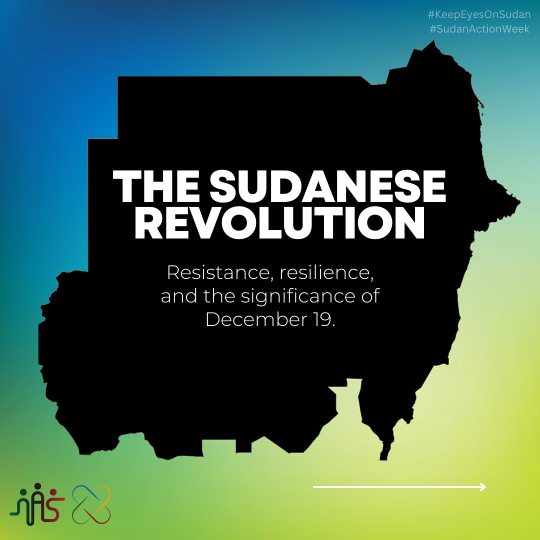
Via NasAlSudan
Learn about the Sudanese revolution, the significance of December 19, and a legacy of resistance and resilience.
Join our call to action today and everyday during Sudan Action Week.
December 19 2023
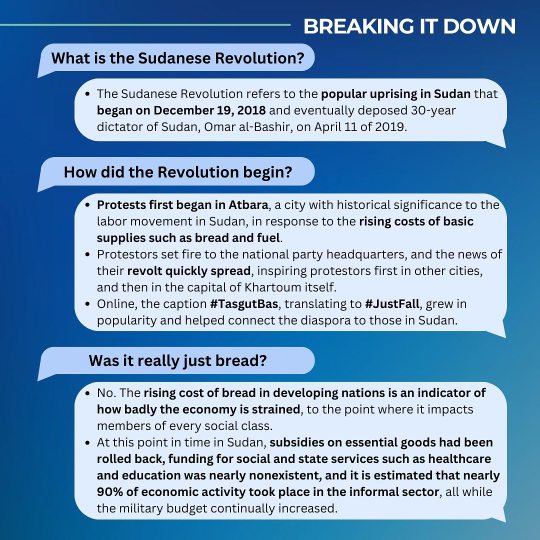
Transcript:
Breaking it down
What is the Sudanese Revolution?
The Sudanese Revolution refers to the popular uprising in Sudan that began on December 19, 2018 and eventually deposed 30-year dictator of Sudan, Omar al-Bashir, on April 11 of 2019.
How did the Revolution begin?
Protests first began in Atbara, a city with historical significance to the labor movement in Sudan, in response to the rising costs of basic supplies such as bread and fuel.
Protestors set fire to the national party headquarters, and the news of their revolt quickly spread, inspiring protestors first in other cities, and then in the capital of Khartoum itself.
Online, the caption #TasgutBas, translating to #JustFall, grew in popularity and helped connect the diaspora to those in Sudan.
Was it really just bread?
No. The rising cost of bread in developing nations is an indicator of how badly the economy is strained, to the point where it impacts members of every social class.
At this point in time in Sudan, subsidies on essential goods had been rolled back, funding for social and state services such as healthcare and education was nearly nonexistent, and it is estimated that nearly 90% of economic activity took place in the informal sector, all while the military budget continually increased.
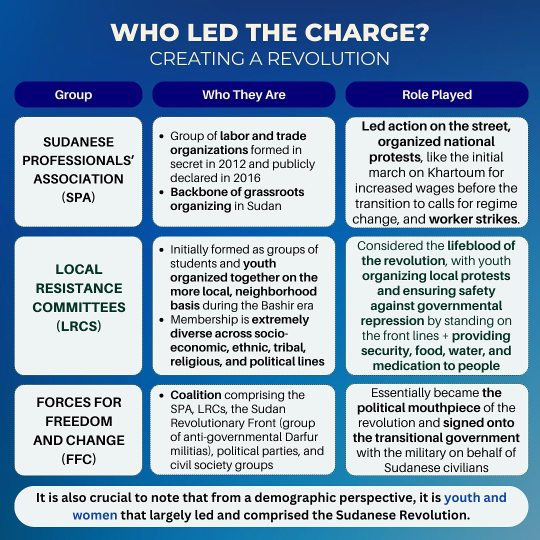
Transcript:
Who led the charge? Creating a revolution
Group: Sudanese Professional's association (SPA)
Who they are:
Group of labor and trade organizations formed in secret in 2012 and publicly declared in 2016
Backbone of grassroots organizing in Sudan
Role played:
Led action on the street, organized national protests, like the initial march on Khartoum for increased wages before the transition to calls for regime change, and worker strikes.
Group: Local Resistance Committees (LRCS)
Who they are:
Initially formed as groups of students and youth organized together on the more local, neighbourhood basis during the Bashir era
Membership is extremely diverse across socio-economic, ethnic, tribal, religious, and political lines
Role played:
Considered the lifeblood of the revolution, with youth organizing local protests and ensuring safety against governmental repression by standing on the front lines + providing security, food, water, and medication to people
Group: Forces for freedom and change (FFC)
Who they are:
Coalition comprising the SPA, LRCS, the Sudan Revolutionary Front (group of anti-governmental Darfur militias), political parties, and civil society groups
Role played:
Essentially became the political mouthpiece of the revolution and signed onto the transitional government with the military on behalf of Sudanese civilians
It is also crucial to note that from a demographic perspective, it is youth and women that largely led and comprised the Sudanese Revolution.
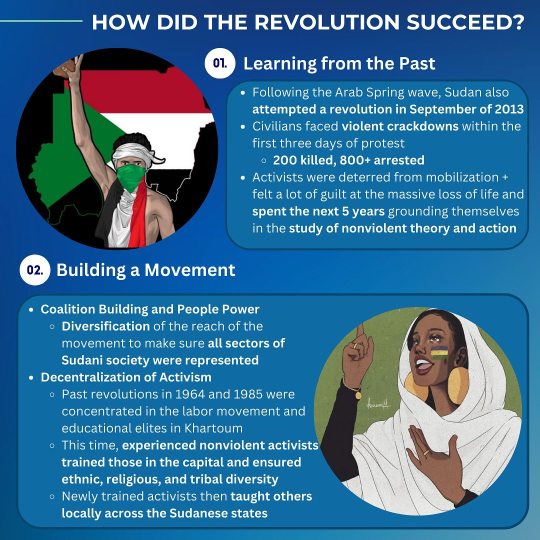
Trabscript:
How did the revolution succeed?
01. Learning from the Past
Following the Arab Spring wave, Sudan also attempted a revolution in September of 2013
Civilians faced violent crackdowns within the first three days of protest. 200 killed, 800+ arrested
Activists were deterred from mobilization + felt a lot of guilt at the massive loss of life and spent the next 5 years grounding themselves in the study of nonviolent theory and action
02. Building a Movement
Coalition Building and People Power
Diversification of the reach of the movement to make sure all sectors of Sudani society were represented
Decentralization of Activism
Past revolutions in 1964 and 1985 were concentrated in the labor movement and educational elites in Khartoum
This time, experienced nonviolent activists trained those in the capital and ensured ethnic, religious, and tribal diversity
Newly trained activists then taught others locally across the Sudanese states

Transcript:
Why december 19?
On December 19, 1955, the Sudanese parliament unanimously adopted a declaration of independence from the Anglo-Egyptian colonial power.
The declaration went into effect on January 1, 1956, which is why Independence Day is officially January 1, but December 19 is when the Sudanese people were truly liberated from colonial rule.
The flag shown is Sudan's independence flag. The blue is for the Nile, the yellow for the Sahara, and the green for the farmlands.
The current Sudanese flag was adopted in 1970, with the colors used being the Pan-Arab ones.
During the 2019 revolution, protestors often carried the independence flag instead as a form of resistance to the narrative of an exclusive Pan-Arab Sudanese identity.
December 19 is ultimately a tribute to Sudanese strength and resilience. It honors our independence and revolutionary martyrs - not just those of the 2019 revolution, but the democratic revolutions of 1964 and 1985 as well.
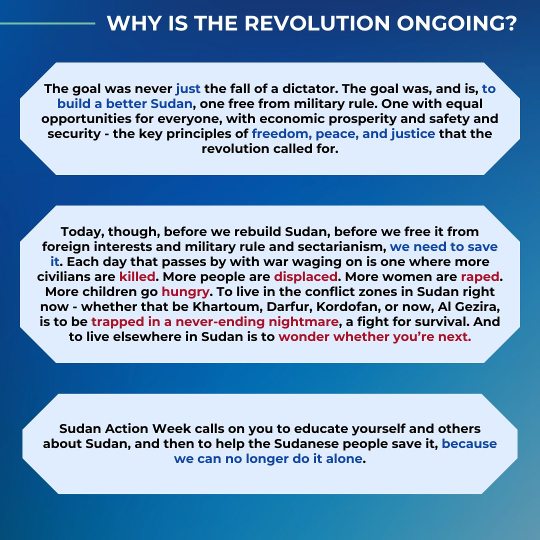
Transcript:
Why is the revolution ongoing?
The goal was never just the fall of a dictator. The goal was, and is, to build a better Sudan, one free from military rule. One with equal opportunities for everyone, with economic prosperity and safety and security - the key principles of freedom, peace, and justice that the revolution called for.
Today, though, before we rebuild Sudan, before we free it from foreign interests and military rule and sectarianism, we need to save it. Each day that passes by with war waging on is one where more civilians are killed. More people are displaced. More women are raped. More children go hungry. To live in the conflict zones in Sudan right now - whether that be Khartoum, Darfur, Kordofan, or now, Al Gezira, is to be trapped in a never-ending nightmare, a fight for survival. And to live elsewhere in Sudan is to wonder whether you're next.
Sudan Action Week calls on you to educate yourself and others about Sudan, and then to help the Sudanese people save it, because we can no longer do it alone.
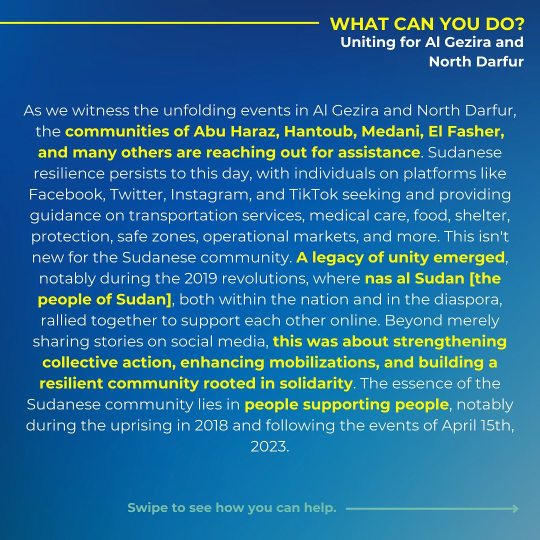
Transcript:
What can you do? Uniting for Al Gezira and North Darfur
As we witness the unfolding events in Al Gezira and North Darfur, the communities of Abu Haraz, Hantoub, Medani, El Fasher, and many others are reaching out for assistance. Sudanese resilience persists to this day, with individuals on platforms like Facebook, Twitter, Instagram, and TikTok seeking and providing guidance on transportation services, medical care, food, shelter, protection, safe zones, operational markets, and more. This isn't new for the Sudanese community. A legacy of unity emerged, notably during the 2019 revolutions, where nas al Sudan [the people of Sudan], both within the nation and in the diaspora, rallied together to support each other online. Beyond merely sharing stories on social media, this was about strengthening collective action, enhancing mobilizations, and building a resilient community rooted in solidarity. The essence of the Sudanese community lies in people supporting people, notably during the uprising in 2018 and following the events of April 15th, 2023
Swipe to see how you can help.
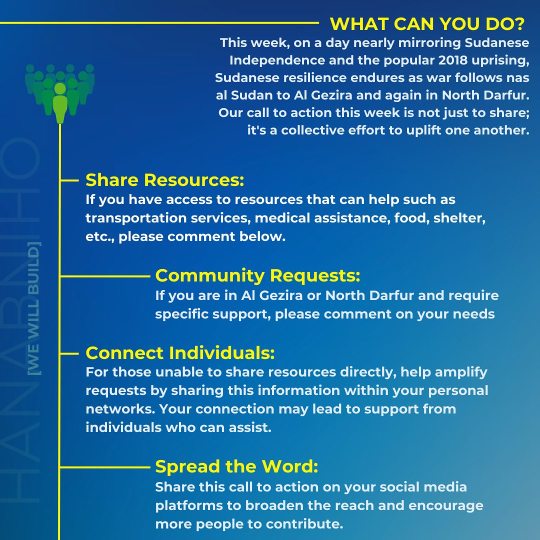
Transcript:
What can you do?
This week, on a day nearly mirroring Sudanese Independence and the popular 2018 uprising, Sudanese resilience endures as war follows nas al Sudan to Al Gezira and again in North Darfur. Our call to action this week is not just to share; it's a collective effort to uplift one another.
Share Resources:
If you have access to resources that can help such as transportation services, medical assistance, food, shelter, etc., please comment below.
Community Requests:
If you are in Al Gezira or North Darfur and require specific support, please comment on your needs
Connect Individuals:
For those unable to share resources directly, help amplify requests by sharing this information within your personal networks. Your connection may lead to support from individuals who can assist.
Spread the Word:
Share this call to action on your social media platforms to broaden the reach and encourage more people to contribute.

Transcript:
Hanabniho
حنبنيهوا
[We will rebuild]
#keepEyesOnSudan
#SudanActionWeek
925 notes
·
View notes
Text
Reassigned
Prompted by @clonexocweek's day one: First Meeting for the rather massive series of Doc's Misadventures! If you're new, start at the beginning with Touch Starved!
We'll return shortly to your irregularly scheduled programming after this short, angsty break!
Warnings: Not a ton of warning: some bullying, some angst; written via phone, so probably could have used some more editing
WC: 1,480

There was a way these things were done; an unspoken social contract dictating some illusion of pleasantries in spite of whatever prejudice or disdain seethed beneath the surface, but I'd been warned long before forcing myself down the nauseatingly pristine halls of Kamino: the squad I’d been reassigned to flaunted their independence in every way they could absent thought of maintaining even a glimmer of such abstract notions of decorum.
I wasn’t deterred by those warnings. The thought of clones not only celebrating what self-autonomy they could but boasting that sense of individuality with unapologetic acts of rebellion offered a comfort both in ridding me of my own nervousness for adhering to the strict code of conduct dictated by rank in those first introductions as well as in the simple relief that they were allotted some glimpse of such freedoms at all. The variation in how closely these soldiers followed that code was staggering, fluctuating not just from legion to legion, but even between squads in the same platoon. Seeing some of the more reserved groups left me with a sense of gratitude for the men I’d initially found myself working with. Wolffe presented himself as some uncompromising, heartless tyrant, but the reverie and warmth that I'd so come to love amidst him and his men was evidence of just how deeply he cared.
But Wolffe wasn’t here. He hadn't offered to escort me like Boost had, a gesture I’d forced myself to turn down lest my first impression with my new squad present me as the weak, needy civi they surely expected. Still… I couldn't deny the deep disappointment, the confusion in how… clean our farewell had been… I hadn't expected tears… not from him, though I’d shed more than my share since learning of my reassignment, but he'd been so indifferent… cold… and that wasn't something I was used to from him… not anymore…
I tried not to focus on the shock that had stolen through me as he’d offered his hand when I'd moved in for a hug, tried to dismiss the ease with which he offered some rote semblance of gratitude for the work I’d done and platitudes toward my continued service with the GAR. I couldn't let myself focus on it, on him. He wasn't my commander anymore. I was no longer the medic of the 104th… For some unknown reason, a captain of the 501st had requisitioned me for a different squad altogether. None of it made sense, but I was in no position to voice objection to those orders. So, I walked through those sterile halls alone, cursing the way my heart pounded harder with each step toward the single room they'd been allocated in the stead of a proper barracks.
I'd read their files; studied reports of their unique abilities in addition to character evaluations that, even from the hands of a Kaminoan were… colorful, and I didn't doubt that they’d been granted ample warning about me, as well. I hadn't decided yet if the incredible strengths they were preported to possess were reassuring or frightening, and tried not to let myself form any conclusions until after at least meeting them.
The door to their room opened without preamble or warning, the software controlling it apparently already recognizing me as a squad member with full access. I stared into the jumble of gear and cables and miscellaneous supplies strewn between beds and tables and couches that certainly weren't regulation for several seconds too long, frozen in both surprise and confusion long before finally realizing that, as cluttered as the room was, it lay utterly empty before me.
Frowning, I slipped my helmet back on, eyes flicking to the chrono. I wasn’t late, nor was I inappropriately early… Glancing once more around the room, I also noticed a striking lack of footlockers at the base of each bunk…
Frown growing even harsher, I stepped back and started quickly toward the hanger. There was a mission already assigned to us, but we weren't slated to depart for several hours… My jaw tensed at the obvious conclusion I tried not to let myself draw, strides just short of rushed. I’d been so focused on what first impression I’d wanted to present that it never dawned on me how readily they'd use the opportunity to fully illustrate their apparent disinterest. Part of me wanted to give them the benefit of the doubt, to grant excuse for an unintentional mistake, but inventing such excuses would only lead to the creation of an endless cycle of similar events, and I had no intention of falling into that role, nor did I intend to make it easy for them to dismiss me so effortlessly, pace growing faster as I finally neared the hanger.
Their ship stood out among the far more popular LAATs, sharp fins boasting an elegance abandoned by the more utilitarian transports around it. I could just make out a pair of figures carrying crates up the ramp. The first quickly vanished within the cabin upon seeing me, but that quick glance was enough for me to note the shear mass of him, thick legs moving with surprising quiet as those final steps quickened to hide him from sight. The man behind him made no such effort to escape as I approached, dark helm tilting with an air of disdain I didn't need to see his eyes to feel.
“Think you've got the wrong ship.” His voice sounded almost hoarse, words drawn out with a slight drawl from lips clearly twisted into a scowl behind the cover of his bucket.
“Afraid not.” There was no apology in my retort, nor did I try to hide my own annoyance as I looked up at him. “I'm-"
“Don't care.” He interrupted, already turning back toward the cargo hold. “This isn't a cruise ship. Go play nurse somewhere else.” I felt the snarl pull at my face, shoulders pulling sharply back as I drew in a short breath to fuel my reply, but another man stepped out from the ship, strides deceptively laxed beneath a haughty stance, arms loose, torso leaned back just enough to give the impression that he was looking down on me despite his slightly shorter statute compared to the others, and I forced myself to release that breath in silence as I turned my attention to him.
“Thought we were supposed to meet at your barracks half an hour ago.” It wasn't a question.
“Must've missed that briefing.” My jaw clenched at the subtle, mocking lilt in his smoky voice.
“You certainly didn't miss the one about Scipio…” I muttered too quietly for the mic to pick up, but the barely perceptible tension that stole through him assured me he'd heard every word, proving the report of his enhanced hearing shockingly accurate. The home planet of the banking clan was, by all political standings, far removed from the war, thus any form of military presence could be grounds for far reaching repercussions. My knowing the location of their next mission was evidence enough of my place here, and he knew it.
I let that silence linger a moment, head tilting down just enough to indicate my impatience toward whatever hazing they’d planned, and to let him know that I knew he'd heard me.
“Seems like you intended on an early start. If your medbay is fully stocked, then I'm ready to go as soon as you are.” I let out a slow breath before I said it, tone reluctantly gentling into an unspoken olive branch I had to convince myself he deserved as I reached up to remove my helmet. He watched me for several seconds, and I loathed the way my skin crawled at that nauseating sensation of being studied, judged; of the unsettling certainty that I would never measure up to the impossible standards granted through a lifetime of training and meticulous genetic design, but I didn’t shy from the emotionless black crescent of his visor.
“It's stocked.” He finally replied, voice stiff, begrudgingly removing his helm as well. He looked so nearly identical to Wolffe and the others… but… not exactly. Beyond the startling half mask of faded ink, I could spot some differences. His nose was bigger, if only just, the already pronounced ridge even more prominent. The arch of his brows was softer, and his jaw slightly narrower. It was his eyes, however, that threatened to paralyze me.
I’d been to feral planets before; found myself the prey of frightfully dangerous beasts. Staring at him carried that same sense of dread, of danger. Here was a predator. He was stronger than me, faster than me, and I’d come to invade his home.
Without another word, he turned and tread back into the sanctum of his ship, and I knew it was the closest to a welcome I was going to get.

Click here or message me if you'd like to be added to a taglist!
Click here for my Masterlist.
#clonexocweek2025#clonexocweek day 1#star wars#the bad batch#tbb#tbb crosshair#tbb hunter#crosshair#tbb wrecker#star wars fanfiction#first person reader#fanfiction#star wars oc#tbb oc#my writings#slow burn#comfort fanfic#crosshair x reader#crosshair x oc#the bad batch crosshair#introductory post#angst#mild bullying
82 notes
·
View notes
Text
“Did you see that Facebook post about the budget cuts?” my co-worker asks. “What the fuck, no,” I reply. She hands me her phone. I see a headline announcing that, due to the push to slash basic services coming from Elon Musk and Donald Trump, 20% of our funding for local public transportation is now threatened. Lawyers are fighting it out in the courts, but if these cuts go through, it will mean less service, possible layoffs, and lots of people not having access to a system that is one of the few lifelines for poor people in our area. People depend on these buses to get to their jobs, to medical appointments, to programs for special needs adults, to court dates.
I sit back down, staring out the window at the cold, grey parking lot. I am waiting for a member of the morning shift to come in with a bus so I can take it out. A few buses dot the bus yard. They’re sitting idle because the parts on order haven’t come in for months—even years, in some cases—and because the city refuses to hire enough mechanics to keep up with daily maintenance. This means that drivers on night shift, like me, sometimes have to wait hours for a bus to arrive. Our transit agency, which contracts out to a huge multi-national corporation, is already dramatically underfunded. The new cuts will only compound our existing problems.
“Fucking Musk, man,” I say with a sigh. Another co-worker on the night shift agrees with me. He’s in his mid-70s, but he’s still working full time because he recently burned through all his savings burying his parents. I launch into a long rant about how both Musk and Trump hate labor unions and workers and want to replace us all with artificial intelligence. A third co-worker, presumably a Trump supporter, grumbles about how “they” just want to blame the cuts threatening our jobs on the “administration.”
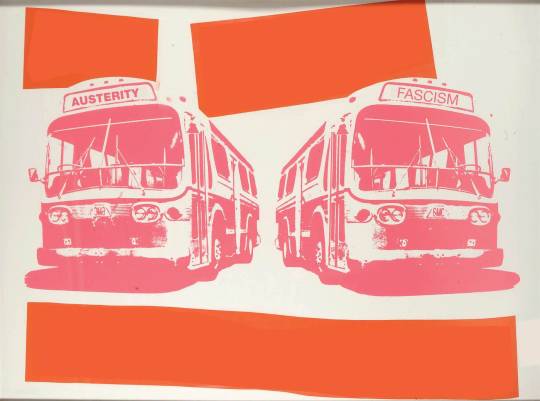
It’s pitch-dark when I enter the trailer park, passing a metal gate, I drive slowly through the ever-growing rows of manufactured homes. Some of them have signs reading “For sale.”
“Lots of people moving out?” I ask my only passenger.
“Yeah, no one can afford to live here anymore,” she replies. As I turn the corner, she launches into a long tirade about the corporation who owns the trailer park and how they keep raising the cost of “space rent,” the monthly fee that mobile home owners pay to trailer park owners. “Every year the rent here goes up. New people move in from out of town and they can pay more, and that’s pushing us out,” she says, as I unhook her walker inside the cold, dark bus cab. “I don’t know why the landlords are so greedy. Do they just want everything?” I lower her and her walker down onto the pavement outside her trailer.
As the electronic ramp whirls its gears, I turn to my left. In her front window, there is a strange collage of images of Donald Trump. It is faded and worn from the sun. I shake my head and chuckle, resisting the temptation to point out the obvious. How can you complain about a corporate landlord ruining your life, but place all of your hopes in another landlord who is trying to become a dictator?
Perhaps she senses my disdain. “Trump is gonna fix it, you’ll see. Prices are going to go down once he starts drilling.”
My eyes narrow. “Biden was drilling more oil than any president before him,” I reply.

I meet all sorts of people like this at my job. One guy smells like piss so bad while I strap in his wheelchair that I have to turn my head so I don’t gag. The car in front of the house where I pick him up has a bumper sticker on it reading, “I Don’t Trust the Liberal Media.” I wonder if the conservative media is telling him his healthcare is about to be nuked from orbit.
Another guy, as I load and unload his wheelchair, takes out his Trump hat, puts it on, and asks me what I think of it. I tell him Trump and Musk want to use the military to shoot protesters, destroy unions, and fire workers like me, so why would I give a fuck about them. He looks away, says, “Alright then,” and jets off on his electronic scooter. I wonder if he is looking forward to ICE deporting half of his neighbors.
On election day, I lost it and got into a heated back and forth with a pro-Trump guy. He rested his case by proclaiming that we need to make it easier on rich people so that the wealth will trickle down to the rest of us. I want to grab these people and shake them.
Trump represents the triumph of the nihilism of our age. The foreclosure of the idea that the working-class can take and shape its own destiny. Instead, apparently, we should throw ourselves at the mercy of a reality TV star who shits in a gold toilet, eats breakfast with billionaire pedophiles, and has dinner with neo-Nazis between rounds of golf. In the absence of the kind of social movements that could connect people and enable them to grow and change, Trump has built a mass parasocial spectacle that makes these isolated people feel like they are part of something greater than themselves even as all of our lives become smaller and smaller, more and more impoverished and alienated.
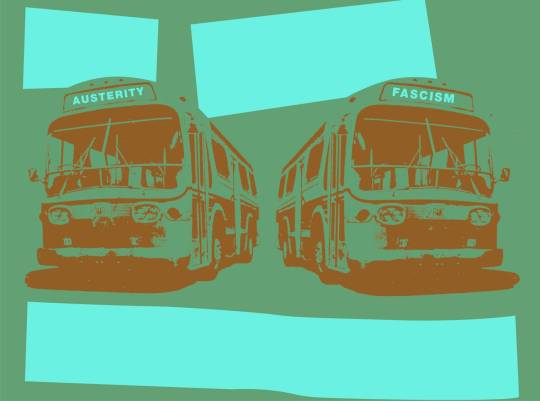
I shuffle into the union hall, past the placards reading “ON STRIKE” and faded signs several decades old. Almost fifteen years ago, during Occupy, I attended a meeting in this same room. I wonder what’s changed since then. I find a seat and one of our union shop stewards slides a packet across the table to me. I open it up and start paging through it, looking at the spreadsheets and graphs.
We start to discuss the ins and outs of the proposed contract that our elected union representatives and corporate lawyers have been going over during recent meetings. One of the much-hated top corporate bosses was recently fired for corruption, much to the delight of the entire workforce. As one of my co-workers said, “Really tells you a lot about a place when motherfuckers are walking around singing, ‘Ding-dong, the witch is dead!’ and morale has never been higher!”
We go through the contract. Despite a few small improvements, things are mostly the same. “What about the pay?” I ask, fingers crossed. The shop steward cocks her head to the side and turns a page, pointing with her pen to a graph showing a dollar increase. She explains that the contract will be for five years, during which time we’ll only be getting a few cents more each year. “This is literally what I was making ten years ago,” I sigh, “and this contract will be valid for five years?”
I already can’t save money. Imagine what things will be like in five years.
She shrugs. “We’re encouraging you to vote “Yes,”’ she says, and hands me a piece of paper on which to mark an “X” signifying yes or no.
If enough workers vote the contract through, the company will ratify it and it will govern my life for the next five years—presuming that I don’t get downsized. Any strike or protest activity will be illegal, as per our “No Strike” agreement. If enough people vote no, it goes back to the union bargaining team, and they will continue to bargain for more changes in closed door meetings.
I head into another room, mark an X by “NO,” and drop the piece of paper into a wooden box. I wave to a few co-workers on my way out. As I leave, I pass a portrait of Sean O’Brien, the president of the Teamsters union. You smug bastard, I say to myself. I remember his glasses and bald head on stage of the Republican National Convention last year, when he called Donald Trump a “Tough son of a bitch.” What a dipshit.
I used to have a poster in my room many years ago, proclaiming, “The past doesn’t pass.” Next to the slogan was a photo of striking Teamster bus drivers—bus drivers, just like me—beating police officers with baseball bats during the general strike of 1934 in Minneapolis. That was one of the decisive labor battles that forced the ruling class to accept the New Deal in order to cool down the class war that was brewing on the streets.
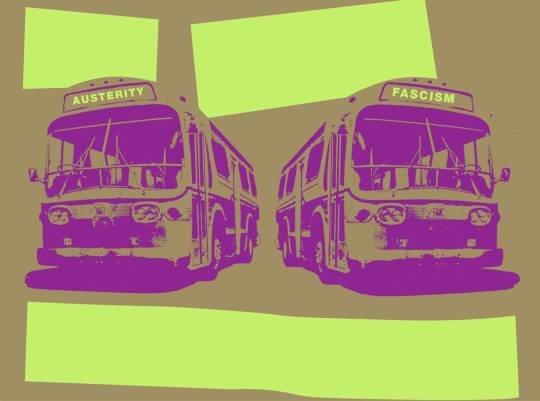
At home, I look over a letter announcing that people in my neighborhood shouldn’t drink the tap water because the levels of uranium in the river are too high. Sometimes I wonder what I would say to my children about this moment in history—if I could afford to have children. Probably the same things my parents say to me now: they’re sorry we are inheriting this world. Sorry they didn’t fix it. Sorry they didn’t build strong enough movements to turn the tide against these monsters.
At work, as I drive, I begin to notice that there are fewer Trump flags and signs out. Resentment is rising. A joke by a cashier here about being replaced by AI, a comment there about Trump cutting programs. I walk into the break room and someone is shaking their head angrily while watching a video of Musk on their phone. They mutter something about tariffs and rising prices.
The tension in the air is palpable. It is similar to how things felt at the start of the economic crisis in 2008, when many of the homes in my neighborhood were foreclosed on and many people lost their jobs. It also reminds me of the start of the pandemic—how at first, I thought it wouldn’t be so bad, only to watch in horror as our family members and friends succumbed to the virus.
In 2008, many people thought that crowds would flood the streets immediately when the administration bailed out the banks while leaving the rest of us high and dry. That didn’t happen. It took years for resistance to grow. In Chicago, workers occupied their factory when they were terminated without pay. In Wisconsin, workers occupied the capitol building against government attacks on collective bargaining. In California, students occupied universities to protest budget cuts. The Occupy movement began in the fall of 2011 and rapidly built to massive occupations of city squares across the US, coordinated port shut downs, and a general strike in Oakland, California. With Joe Biden as vice president, the federal government helped to coordinate violent raids targeting the movement in order to break it apart.
In 2020, on the other hand, things didn’t fester—they exploded like a bomb. Millions of people across the country mobilized in response to the pandemic, providing mutual aid in the face of government inaction and right-wing disinformation, and then hit the streets in the George Floyd uprising.
Who knows how things will evolve this time. It will probably be different from both of those scenarios, but it could be similar in some ways. What is clear is that things are not as people expected them to be. Many people on the left thought—or at least hoped—that Trump would govern the way he did the first time, constrained by mass protest, the courts, and his own party. Many who voted for him honestly did not expect him to follow through on many of the policies he explicitly promised to carry out. Those who were not paying attention are surprised that suddenly, jobs are disappearing and services are being cut while prices only continue to rise.
The material conditions are forcing people to reckon with the fact that the state is attempting to reshape our lives for the sake of an authoritarian project. As we speak, thousands of people are flooding town halls across the United States, screaming at their so-called representatives about the plan to gut programs like Medicaid—only to hear the bureaucrats repeat a slew of MAGA talking points. Anger is brewing. Hopefully the MAGA strategy of “flooding the zone” with shit will produce diminishing returns as people turn towards their neighbors and co-workers and away from their phones and YouTube.
This is an opportunity for us to call out the authoritarian project of the Trump administration, the techno-dystopian fantasies of billionaires like Musk, and the complicity of the Democrats who helped make all of this possible. Beyond naming the systems that we are up against, we also need to be clear about our position as workers and how the billionaires running the country want both to hurt us and to weaponize our anger, turning us against each other through propaganda and fearmongering. This is why it’s important to stand in solidarity with everyone attacked by the Trump administration, whether trans folks, migrants, prisoners, or beyond. We can’t leave anyone behind. The only immigrant trying to steal my job is Elon Musk. It’s time to be clear that our interests are not theirs; we must develop and promote our own vision of a better world in total opposition to the ruling class, the billionaires, and their fascist puppets.
Moreover, it’s time for action. We need to give expression to these antagonisms while revealing the poverty of the institutional forms currently at our disposal—the Democratic party, the ever-shrinking union bureaucracy, the non-profits. We can show examples of past struggles and resistance from the mass wildcat strikes by teachers in West Virginia and the fierce anti-fascist mobilizations against the alt-right to the airport shutdowns following the Muslim Ban. We can support and expand the existing fronts that are already breaking out around us: protests against Musk outside of Tesla, rallies to demand that hospitals continue to treat trans people, community defense and rapid response networks to address ICE attacks, bashing back against the violence of the far right. We can demonstrate the utility of tactics and strategies that others can take up and expand on as all of us figure out how to fight in the new reality.
It’s hard to look at the news without imagining tanks on the streets or scenes out of V for Vendetta. But the scenario I worry about most is that this will simply become the new normal. That we will accept this just as we accepted the last round of attacks. As we accepted the genocide in Gaza. As we accepted the ecological gun to our heads that is climate change.
While people are angry and energized, we have a chance to push in a new direction. Let’s use this moment to foster broad and popular networks of resistance that improve our lives, strengthen our communities, and enable us to meet our needs directly. At this point, we don’t have much of a choice.
Like it or not, this is life now—and it is coming for all of us.
-“The Only Immigrant Trying to Steal My Job Is Elon Musk” A Bus Driver’s Perspective on Elon Musk’s Austerity Measures
77 notes
·
View notes
Text

"Somehow disruption doesn't begin to cover it. Upheaval might be closer. Revolution maybe. In less than two weeks since being elected again, Donald J. Trump has embarked on a new campaign to shatter the institutions of Washington as no incoming President has in his lifetime.
He has rolled a giant grenade into the middle of the nation's capital and watched with mischievous glee to see who runs away and who throws themselves on it. Suffice it to say, so far there have been more of the former than the latter. Mr. Trump has said that 'real power' is the ability to engender fear, and he seems to have achieved that.
Mr. Trump's early transition moves amount to a generational stress test for the system. If Republicans bow to his demand to recess the Senate so that he can install appointees without confirmation, it would rewrite the balance of power established by the Founders more than two centuries ago. And if he gets his way on selections for some of the most important posts in government, he would put in place loyalists intent on blowing up the very departments they would lead.
He has chosen a bomb-throwing backbench congressman who has spent his career attacking fellow Republicans and fending off sex-and-drugs allegations to run the same Justice Department that investigated him, though it did not charge him, on suspicion of trafficking underage girls. He has chosen a conspiracy theorist with no medical training who disparages the foundations of conventional health care to run the Department of Health and Human Services.
He has chosen a weekend morning television host with a history of defending convicted war criminals while sporting a Christian Crusader tattoo that has been adopted as a symbol by the far right to run the most powerful armed forces in the history of the world. He has chosen a former congresswoman who has defended Middle East dictators and echoed positions favored by Russia to oversee the nation's intelligence agencies.
Nine years after Mr. Trump began upsetting political norms, it may be easy to underestimate just how extraordinary all of this is. In the past, none of those selections would have passed muster in Washington, where a failure to pay employment taxes for a nanny used to be enough to disqualify a cabinet nominee. Mr. Trump, by contrast, has bulled past the old red lines, opting for nominees who are so provocative that even fellow Republicans wondered whether he is trolling them.
The message to Washington is simple, according to Roger Stone, the longtime Trump friend who relishes his own reputation as a political dirty trickster. 'Things are going to be different,' he said by text."
-- Peter Baker, "Trump Signals a 'Seismic Shift,' Shocking the Washington Establishment,' The New York Times, November 17, 2024.
Here's another incisive article about President-elect Donald Trump's transition and his frightening Cabinet nominees, who are abnormal even for Trump and the personality cult that has been built around him since 2015. For the past quarter-century, Peter Baker has been one of the very best, most level-headed analysts of the contemporary American Presidency, and he seems be stunned by the direction the incoming Trump Administration is already heading. Once again, all of these links are gift links to bypass the New York Times paywall so that you may read and share these important pieces and remain alert to the very real consequences of the 2024 election which are already taking shape.
#Presidential Transition#Presidency#Donald Trump#President Trump#President-elect Trump#Trump Administration#Trump Transition#Trump Cabinet#Cabinet nominees#Presidential Election#Politics#Executive Branch#U.S. Government#ELECTIONS HAVE CONSEQUENCES#These Are the Consequences#Matt Gaetz#Pete Hegseth#Robert F. Kennedy Jr.#RFK Jr.#Tulsi Gabbard#MAGA Movement#MAGA Cult#Personality Cult#Peter Baker#The New York Times#New York Times#White House#Presidential Cabinets
102 notes
·
View notes
Text
"Whereas health care for women should also adress the needs of men, families, and communities as they relate to women`s health care."
Who Owns Women’s Health? The Quiet Invasion of Male-Centered Policy
Imagine seeking healthcare tailored to your needs, only to be told that your care should also prioritize someone else. This is the reality women face as policymakers subtly reshape the language around women’s health. A recent example of this appears in the wording: “Whereas health care for women should also address the needs of men, families, and communities as they relate to women’s health care.”
At first glance, it might sound inclusive. But make no mistake—this is a deliberate shift that undermines women’s bodily autonomy. Instead of recognizing that women’s health deserves dedicated focus, it reframes it as something that must serve others. This is not just semantics; it’s a dangerous step toward erasing women’s self-determination over their own bodies.
The Consequences of Reframing Women’s Health
Medical Decisions No Longer Centered on Women – If women’s healthcare must account for men and families, it risks deprioritizing the specific needs of women. This could lead to funding cuts for reproductive health, fewer specialized services, and a system where women are not the primary focus of their own medical care.
A Trojan Horse for Restrictive Policies – Language like this paves the way for policies that justify male oversight in decisions about contraception, pregnancy, and abortion. If women’s health is framed as a "community" issue rather than an individual right, it becomes easier for lawmakers to impose restrictions under the guise of considering broader interests.
The Return of Male Authority Over Women’s Bodies – History has shown us what happens when men are allowed to dictate what women can and cannot do with their bodies. From forced pregnancies to restricted birth control access, societies that strip women of bodily autonomy ultimately deny them full personhood.
Who Benefits from This Shift?
This language change isn’t happening in isolation. It’s part of a broader trend where conservative policymakers seek to roll back women’s rights by making them seem less like rights at all. If women’s health is framed as something that must cater to men and families, it ceases to be about women’s individual agency. Instead, it becomes something that others—often men in positions of power—get to control.
The Bigger Danger: Women Losing Their Say
If men’s interests must be "addressed" in women’s healthcare, what happens when those interests conflict? Should a husband’s desire for more children outweigh a woman’s need for contraception? Should a father be able to veto his daughter’s decision to seek reproductive care? These are not hypotheticals—these are the real-world consequences when policies stop centering women in their own health discussions.
What Can We Do?
Call it out – Challenge these seemingly subtle shifts in language and expose their dangerous implications.
Push for policies that reaffirm women’s autonomy – Women’s healthcare must be about women, first and foremost. Period.
Refuse to let history repeat itself – We’ve fought too hard for bodily autonomy to let it be rewritten under the guise of "inclusivity."
Women’s health is not a community project. It is a fundamental right. And we cannot afford to let anyone redefine it as anything less.
#usa news#us politics#anti trump#elon musk#liberal feminism#president trump#trump is a threat to democracy#white house#feminism
69 notes
·
View notes
Text
Michelangelo Signorile at The Signorile Report:
I ordered four free Covid tests from the government last night after reading that the Trump administration was shutting down the program—in which tests are distributed to Americans—and was considering destroying 160 millions tests. Until the story blew up after the Washington Post began reporting on it, they were planning to stop taking orders at 8 p.m., “transitioning away from government-distributed at-home tests to the commercial market just as we have in the past,” said a Department of Health and Human Services spokesman. Even if “transitioning away” from the free distribution was a good idea, why would you destroy all the tests you have? We, the American people, paid for those tests! Trump and his lieutenants claim they’re about stopping waste and fraud, but here they were, about to destroy $500 million in tests that we may urgently need if there is a Covid surge. Sure, it costs money to stockpile them. But it actually costs more to destroy them—and even more to buy new ones if you need them. We all remember when, under Trump’s first term, they didn’t have enough tests. Now they were talking about destroying what they had. Sheer lunacy. Why? It seems pretty simple. Trump hates them. He hates the idea of them. He hates the mere presence of of them. He hates what they imply: That testing is important, and that the government should have enough tests—and that he completely bungled it himself, and did not make that a priority in his first administration. Trump’s dire mismanagement of Covid was highlighted by the shortage of tests early on (and their really haphazard plans to get them), which would have helped slow the transmission of the virus. And, in his mind, Trump lost the election in 2020 because of the pandemic. After the Washington Post revealed the plan to destroy the tests—having obtained documents and emails—the administration reversed course in a rare turnaround, and said it will continue to take orders and stockpile the tests. I’m sure the reversal was more about the optics of destroying hundreds of millions of dollars of taxpayer-funded medical tools while they’re claiming to cut waste than anything else.
And it exposes what a madman Trump truly is, someone in continued cognitive decline who, like other dictators, is obsessed with reconfiguring the world—carving it up with Vladimir Putin, and, perhaps, President Xi of China, his fellow authoritarians—while letting Elon Musk slash and burn everything domestically. The cruel, frightening action of removing transgender people and the “T” in LGBT from the National Stonewall Monument website was right out of the playbook of deranged, controlling, and compulsive fascists—as is the destroying of Covid tests simply because of what they represent. It’s similar to his drive in cutting off of foreign aid, causing millions of people in what Trump has called “shithole” countries to suffer and die of disease. Musk is behind many of the cuts in funding, and he surely is down with the transgender erasure—he’s a transphobic hatemonger who berated his own daughter who came out as trans—but Trump is the president, making the decisions. He clearly likes these ideas when they’re brought to him. And we know many of the most horrendous actions are driven by Trump and his own racist impulses, which have led his charge against diversity, equity and inclusion.
This is cruelty in action by the Trump Regime.
85 notes
·
View notes
Text
The War Correspondent: Russell Shaw x Reader

Tagging: @kmc1989 @Claymoresofinfamy23 @mqdhvtter @bribow010 @encounterthepast
Companion piece to: Home

Russell’s relationship with you starts because of mysterious message left on his cell phone by Marcus Madden, a retired war correspondent who used to be attached to his unit in the Army.
“Russell, I need to see you. It’s about Dex…”
Dex was a Lieutenant that was killed during a firefight back when they were deployed and one of Russ’s closet friends. Russell had been the one to escort the coffin all the way back home, to stand guard until the funeral.
When Russell turns up at Marcus’s house, he’s greeted by an inferno, cloying smoke and flames licking their way up into the night sky. The fire crew are already on the scene trying to put out the blaze but Russ already knows there won’t be any survivors.
It’s a day later that he turns up at your door. He knows Marcus had a daughter who was a Medic in the service, that when she left, she set up shop as a P.I. It’s taken him a while to track you down because you’re unlisted.
When you open the door he doesn’t expect you to be so breathtaking. You must take after your mother, he thinks as he introduces himself.
“Your father left me a message.” He begins and he’s granted access almost immediately.
It turns out you’ve been looking into articles your father was working on before he died. His laptop and hard drives may have burned up in the fire but you have access to his cloud. The two of you compare notes, he fills you in about Dex and you manage to narrow down the story your father was working on.
A motivational speaker whose earned hundreds of thousands of dollars describing his experiences as a veteran. His name Dex Hutton.
“It’s not him.” Russell tells you as he studies the documentation and images of this assholes. “The events he described are the same but Dex is dead, he has been since 2016.”
You spend the rest of the evening investigating the impostor. You manage to ascertain his name is Ray Smyth, that he worked in admin services during his time in the Army, typing up mission reports before he was rewarded with an honourable discharge, never seeing combat. He started attending veterans meetings using Dex’s name, telling his war stories before he was asked to speak during a fundraiser and his career took off there.
“He has an event tonight.” You say and Russell is already pulling out his credit card to book tickets.
The two hour session is the most excruciating thing that Russell has ever had to sit through. He listens to this asshole dictating his friend’s life, recounting those stories as if they were his own and it sends a pulse of rage through him. It isn’t until your hand comes to rest on his clenched fist, fingers slipping into the grooves of his knuckles that he allows himself to exhale because no matter how bad this is for him, it’s much worse for you.
It's at the end of the session when Smyth is signing books that he’s arrested for your father’s murder. You’d sent the evidence you’d collated to the police before you’d entered the conference room. Russ would have preferred to kill the motherfucker but this punishment is much worse for a man of Smyth’s character. He’s being eviscerated in the press, his lies exposed. It’s the humiliation that will kill him, you tell Russ and it does long before the trial starts when they discover him hanging in his cell.
Before he returns to his life with The Horizon Group, Russ leaves you his number, jotting it down on one of your post it notes.
“Just in case.” He says, squeezing your hands between his.
You don’t expect him to attend the funeral, but he does with the other surviving members of his unit, all clad in their dress blues to honour your father. He stays behind in the aftermath, helping to clean up the remains of the wake. He ends up sleeping on the couch because you spend the night drinking bourbon and swapping stories. When you wake up the next day he’s gone, the sheets and pillows neatly folded up on the arm of the sofa.
He checks in often after that, dropping by for coffee, taking you out for lunch. He tells himself it’s what your father would have wanted but the truth is he enjoys spending time with you. You don’t pull punches, your wicked smart and you make him laugh. Just the thought of your smile is enough to make his heart beat a little faster in his chest.
Lunches turn to dinner and before he knows it, Russ is in falling in love.
It isn’t him that makes the first move it’s you. He’s too aware of the circumstances of how all of this started, he doesn’t want to take advantage of the situation. When he walks you to the doorstep, he says goodnight but before he can leave, your hand slips into his pulling him back to you and that’s when it happens. You kiss him and Russell, he’s never felt anything like it.
You take him to bed that night, undressing him slowly, hands chasing all over his body with delicate, lingering touches that set his nerve endings ablaze. Everything before you has been fast, hard, rough but this is soft, tender, reverent.
He spends hours tangled up in you, his name on your lips as he loves you like he has never loved anybody else. When he wakes up the next morning, he sticks around, making coffee and breakfast because for the first time in his life Russell doesn’t want to leave, not until he has to.
“The next time you’re back in town…” You begin when it is his time to go and Russell’s palm comes to rest upon the nape of your neck, drawing you for a kiss.
“Oh honey.” He whispers against your lips. “I’ll be here at weekend if you’ll have me.”
“Always.” You promise him, your fingers running through his hair. “There’ll always be a place for you, right here with me.”
Love Russ? Don’t miss any of his stories by joining the taglist here.
Interested in supporting me? Join my Patreon for Bonus Content!
Like My Work? - Why Not Buy Me A Coffee

142 notes
·
View notes
Text
In the United States, there is a very big, “Well, what about me?” complex that dictates much of how people go about their day, make their decisions, and vote for the next president. The thought process has always been formatted around placing the needs of yourself above those of everyone else. Which, inherently, is not a bad thing; everyone is allowed to be selfish.
It becomes a “bad thing” when the needs of others are being actively suppressed and threatened by the current administration. It becomes a “bad thing” when the candidate in which you endorsed, voted for, and actively support has an agenda written on the basis of hate. It becomes a “bad thing” when the rights of all citizens—including those that had been selfish—are placed in a state of jeopardy.
In the last forty-eight hours, Donald Trump has signed executive orders that pardoned t*rrorists (anyone who engaged and/or actively supported the insurrection on January 6th, you are a t*rrorist), removed the United States from climate treaties and health organizations, removed access to a government-ran website structured around female healthcare and reproductive resources, removed access to an app that helps prospective migrants come into this country legally, removed a bill that lowered the cost of life-saving medication, actively discriminated against the LGBTQ+ community on the inaugural podium, removed a law that prohibited employment discrimination based on race/sex/age/etc., is attempting to remove birthright citizenship, et cetera. The list is as endless as it is terrifying.
All of this for lower gas and grocery prices? Oh, well, actually, that will not be possible given the implementation of the External Revenue Service that seeks to use tariffs for exports/imports. Where do people believe that money will come from to pay those tariffs? Hint: It is not the country being charged the tariff.
When the whole first row at the inauguration seats the billionaires of this country—and the ones running our social media platforms—that is a red flag. When the president of the United States is chummy with some of the most deplorable world leaders known to man, that is a red flag. When the current president has multiple charges against him (and lost in court) which legally classifies him as a r*pist, that is a red flag. When the president willing admits to election fraud at the hands of the man who willingly performed, two times, a N*zi salute on live television during the inauguration, that is a red flag.
A flag red enough to match the hats of those who have the blood of America on their hands.
Is it great again yet?
#politics#anti donald trump#fuck donald trump#if you voted for him unfollow me#united states#usa politics#usa#tw: donald trump#tw: politics#tw
32 notes
·
View notes
Text
Advice for Turtle Islanders
Hey everyone, I’m aware that I’m very privileged to live in a country where the government are like, regular level shit instead of Trumpian, so I wanted to help out people living in the so-called USA however I could. Here’s my advice for what it’s worth - I don’t have experience living under an authoritarian state but I have studied history and been paying attention to what everyone has been saying in the past few weeks, so I thought I’d offer some of my suggestions for how to keep yourselves and your neighbours safe going forward. It’s hard to know what to go so far as to suggest, since it’s just so unpredictable what might happen over the next few years. But in the interests of predicting every eventuality, I hope you’ll overlook any particularly outlandish suggestions. Hopefully it won’t get as far as some of these actions imply, but it’s always better to be prepared than blindsided. You don’t have to do all these things. Just do what you can, and remember you aren’t alone
-Join a labour union, go to meetings, and be prepared to strike
-Attend protests even if you think they won’t do anything. But bear in mind you will increasingly risk arrest and police brutality. Dress unremarkably, don’t take photos at protests and DEFINITELY don’t share them online
-Call your senators, congresspeople, governors, state legislators, mayors and city councillors. Continually bother them and kick up a fuss about even the smallest thing you disagree with. It’s important to keep government busy so implementing evil legislation is harder
-Set up or volunteer with a community fridge/kitchen or homeless shelter
-Knock on your neighbours’ doors and start getting to know them. If they are safe people, build relationships of reciprocity and care with them
-Read. Expose yourself to as many ideas as you can, but especially political theory, queer storylines and other subversive texts. Some recommendations:
Hope in The Dark by Rebecca Solnit
The Dispossessed by Ursula K Le Guin
How to Stand Up to a Dictator by Maria Ressa
Anything by Marx, Kropotkin, Chomsky, Gelderloos, Freire, Fanon, Foucault, Harvey, Graeber, etc
Braiding Sweetgrass by Robin Wall Kimmerer
The Faggots and their Friends Between Revolutions by Larry Mitchell
Pirate Care by Marcell Mars, Valeria Graziano and Tomislav Medak
No Ordinary Men by Elisabeth Sifton and Fritz Stern
Conspiracy of Decency by Emmy E. Werner
-Try to set up or join a local group in your community that discusses political or philosophical ideas, does consciousness-raising, builds connections between neighbours, provides stopgap services to desperate people, teaches people their legal rights, or some equivalent act of mutual aid or resistance
-Key in to existing activist networks for climate, racial, migrant or gender justice - attend their events, fund them, give your time
-Consider whether at some point you’d be willing to do things the government will tell you are forbidden, risking arrest, imprisonment and possibly more severe consequences further down the line. You will have to answer to your own conscience but it’s also important to try and keep safe. If you’re willing to hide people from ICE or the police, source ‘illegal’ HRT and other essential medication, lose or falsify records, help someone get reproductive care, spread forbidden ideas, graffiti or poster government buildings, hold sit-ins, occupations or encampments, key certain people’s cars, let people in or out at borders who you aren’t ‘supposed’ to, sabotage fossil fuel or military infrastructure, disrupt party conventions, withhold tax, film or take photos in places where it’s banned, conscientiously object should a draft come in, or other similar behaviours, do them quietly and carefully. Involve as few other people as possible and DO NOT in the coming days broadcast your willingness to do so. Also for legal reasons I’m joking 😉
-Pick a behaviour from the government which, if enacted, would result in you immediately leaving the country. Once they do this, get OUT. Don’t make it too small, but don’t wait until they’re rounding up journalists in the street, holding public executions or imposing military curfews either. (I’m not saying any of these things will happen, I’m just saying pick your line.) If you’re trans, this event might have already happened, in which case start the process of seeking work or asylum abroad. Do your due diligence - make sure the place you choose will be safe for people like you, and bear in mind that asylum seeking is a big step that will expose you to dehumanising bureaucracies and local hostility even in the most liberal countries
-Put together a go-bag
-Donate any money you can spare either to these advocacy groups or to people in need directly
-Be radically, aggressively kind and compassionate to everyone you meet
-If you have children or are responsible for them, talk to them about what is happening. Strike a balance between explaining to them that it’s important to stay true to our principles and making sure they know to be careful
-Take time to be with loved ones and experience moments of joy, whether this is group meals, days out, shared catharsis, birthdays, religious celebrations, making music, movie nights, whatever replenishes you and reminds you what the fight is for
-Pick an hour each day in which to engage with and respond to the news (broadcast channels, papers, social media). The rest of the time focus on your well-being, that of your family, friends and neighbours, on your job, on being kind, on your volunteering, on resisting in countless tiny ways. Unless something big and emergent is happening in which case respond and react in real time
-Seek out good news stories from your own country and the world. They are out there, I promise
-If you see an arrest or immigration raid, get your phone out and start filming. You have a right to record it
-Donate to bail and strike funds
-Spend time in nature, and learn the names of local trees, flowers, birds, mammals, fish and reptiles. Educate yourself about the natural history and ecology of your local area so you can replenish your mental health, defend your environment and remember that there is life beyond the fascist state’s delusions of total control
-Learn about and engage with your local indigenous tribes. Study their history, attend any events they put on that are open to the settler public, donate money and any supplies they might need, agitate for their rights, see if you have any land you could transfer to their stewardship, and learn some of their languages if they think that’s appropriate
-Make an effort to research and understand things that are happening abroad. The US empire thrives on isolationism, ignorance and poor education. Learn foreign languages, follow other countries’ politics, study their history, watch their films, expose yourself to their cultures and teach yourself to point them out on a map. The more you feel affinity with people across the globe, the more you are a citizen of the world and able to keep your heart safe from narratives of exceptionalism - because you’d best believe the propaganda will be targeting you too. You’re not immune to it. You have to work at resisting. Foreign news services can also help you keep a handle on what’s real if your national ones are lying to you
-Run for school board, union rep, a welfare or campaigning role on your college campus or in your place of worship, or some other small-scale local post where you can make a difference
-If you’re in a position to do so, see if you can help marginalised people receive cheaper services through your job, volunteering or advocacy (for instance offering discounted rates if you run your own business)
-Learn first aid, cooking, and basic clothing repair, and teach these skills to others. Use them to help people with relevant needs
-Pick your battles. Sometimes you might have to let smaller things slide in order to make a bigger difference later. Other times, the small things will be the thin end of the wedge and you’ll want or need to take a stand
-Wear a mask and try to keep up to date with your vaccinations
-Be ready to mobilise your community to protect vulnerable people or places from vigilante attacks, especially if there’s a mosque, immigration centre, lgbt venue or abortion clinic in your neighbourhood
-Download the Signal app and Element software. Get a VPN. Turn off ‘learn from this app’ in your phone’s Siri settings for every app. Leave your phone at home if you’re protesting or doing anything else spiky. Put it in the fridge or at the other end of the house if discussing things you don’t want overheard. Assume you are under surveillance most of the time
-Carry narcan
-Get a library card and take out as many books and DVDs there as you can, use the internet there, stay warm there, really make use of the public service. You can even offer to volunteer there if you have time
-See if you can access academic and scientific papers somehow, and make an effort to read at least one over a semi-regular period of time. This will help with the education mentioned above, as well as keeping you in touch with the truths which your government is so eager to suppress. Lots of downloads also helps an academic in their career, which will be very valuable now that so much of their funding has been cut
-Pick up your neighbours’ groceries or prescriptions for them, drop them off at/pick them up from medical appointments, watch their kids, bail them out and cook for them
-Quit twitter. Use BlueSky instead if you want but don’t assume you are unobserved there. Consider quitting Facebook and Instagram too if you can - Supernova offers a vaguely similar user interface to insta if you want to keep up with friends and continue sharing pictures
-It might help your sanity to start keeping a diary or journal, detailing your emotions and experiences and keeping an eyewitness record of your government’s behaviour. If you do this, though, consider keeping it in a secure hiding place or writing it in code. Perhaps send a copy securely to someone outside the country, but only if you can do so safely, and be ready to destroy it if you think you’re in danger from its discovery
-See if you can get involved with or start a movement for community green energy in your local area
-If you have any garden space, try to plant and grow a bit of your own fruit and veg
-Get trained in non-violent direct action and in self-defence
-Save as much money as you can. You never know when you or someone else might need it
-If it’s accessible to you, consider getting a therapist to talk through the difficult experiences and painful emotions that are going to come up in the next few years. But be careful - make sure you trust the professional you use and that your conversations are as private as possible. Even if both of these are the case, be considered as to how you phrase things
-Walk, cycle, or take public transit whenever possible
-Make art! Paint, draw, sing, play instruments, write stories or poetry or lyrics or plays, act, dance, collage, sculpt, whatever frees your heart and keeps it your own
-Donate individually or through orgs to sex workers, domestic violence survivors, Romani and Traveller individuals, and other people at risk of precarious housing and/or income
-Educate yourself about Islam, Judaism, Hinduism, Sikhism, Buddhism, Jainism, Zoroastrianism, Paganism, Indigenous Spiritualities and other non-Christian religions
-Carry a spare scarf to offer to a hijabi whose hijab might be torn off by vigilantes
-Offer court support to friends and neighbours
-While you still can, source and distribute as many binders, packers, breast forms and pairs of tucking underwear as possible
-As much as possible shop with small local independent businesses, and follow consumer boycotts
-Consider eating less meat. Ignoring the environmental and ethical implications of the meat industry, deregulation is likely and this means many food safety standards will be scrapped
-If you can afford it, get an air filter for your house and a water filter for your tap
-See if you can file lawsuits against government bodies or big companies for violating various laws and rights
-Make sure the disabled people in your community can access spaces, services and transit, that they have enough money for necessities and for disability aids, and that there’s an evacuation plan for them in the event of flooding/fires/a tornado/vigilante violence/government violence
Stay safe out there everyone. Look after each other, keep your head high and your heart soft, and survive.
#hopepunk#solarpunk#cottagepunk#environmentalism#social justice#bright future#optimism#community#tidalpunk#climate justice#usa#America#turtle island#trump#resistance#defiance#us politics
41 notes
·
View notes
Text



Sonic Underground: Guardians
Notes:
Aleena had tried to ensure all of her children were in deposited safely, but unfortunately, this did not happen as planned
Uncle Chuck
Chuck had heard of what his sister-in-law had been told by some crackpot oracle and tried to head off Aleena as she dropped off her children
However, he was only able to locate retrieve Sonic, and, due to the circumstances, believed his other nieces to be dead
Furious with both Aleena and himself, he went underground with Sonic
Chuck and Sonic were on their own for a few years, with Chuck helping the resistance where he could while helping Sonic figure out and work on his speed
Sonic (8) found an abandoned Tails (3) when he was exploring a woodlands area during one of their "Camping Trips" and brought him home
Chuck wasn't planning on adopting Tails (having planned on trying to locate the pups parents or at least drop him off at the Sanctuary), but ended up getting as attached to the kit as much as Sonic had
He was mostly winging it with them (apparently most people don't let their 4 year old disassemble and reassemble a tank engine to see how it works or check their 9 year old's running speed with a police speedometer)
He lost his leg during his last 1-1 encounter with Robotnik at the start of his takeover (a fair enough trade for the destroying the dictator's eyes and arm in his opinion)
Chuck was the initial reason Robotnik hated hedgehogs due to their shared history
Lady Elodie Windermere
Lady Windermere is a Bear (bc she's apparently not a bear but a dog in canon???)
Elodie had just lost her husband when Sonia showed up on her doorstep
Sonia was her sign to keep moving on, and she dedicated herself to Sonia's happiness and safety
Due to Robotnik's hatred of hedgehogs, she told everyone, including Sonia herself, that her ward was a Tenrac
going so far as to hire a tenrac maid in order to fake medical records for her protection
Sonia was made to cover her ears (the key visual difference between the two species as well) when going out in public and as she grew older, hide her back quills with custom reinforced corsets
As one of the highest aristocrats, she covered this by setting a new fashion trend of "earcaps" amongst the younger members of the court, allowing Sonia to blend in further
When Sonia's super strength revealed itself, Elodie worked with her daughter personally on her control, working with her in their gym as well as hiring self defense trainers for Sonia to have a good outlet
Went full Mama Bear mode on Sleet and Dingo when they DARED suggest arresting her daughter
Her arrest caused much scandal amongst the aristocrats, as she was the one most turned to when they needed a listening ear, and a resulting source of several dozen secrets NO ONE wanted to reach Robotnik's ears
Farrell
Farrell is a Cricket
former war veteran (medic)
he lost most of his upper right arm and was honorably discharged
despite his service, it wasn't long before he was living on the streets, where he spent the next 3 decades mastering the all the skills he'd need to survive and establishing a low-crime ring
Of all Farrell's students, Manic was his favorite, and made sure his kid had "nothin' but the best"
best as he could manage anyways
despite the attention it drew, he encouraged Manic's "jam sessions"
when Manic was younger, it wasn't uncommon for him to fall asleep to Farrell's chirping lullaby
their hideout was an abandoned weapon factory in the industrial district that the Swatbots "miraculously" kept missing
Manic learn a lot of his tech skills from playing with the old abandoned machinery
Size Ref

COMMISSIONS OPENED
Kofi
#Sonic#Sonic Underground#Uncle Chuck#Sir Charles the Hedgehog#Chuck the Hedgehog#Sonic the Hedgehog#Tails the Fox#Miles Prower#Miles Tails Prower#Lady Windermere#Elodie Windermere#Sonia Windermere#Sonia the Hedgehog#Farrell#Farrell SU#Farrell the Cricket#Manic the Hedgehog#Sonic and Tails#TheAngryComet ART#Character Redesign#Character Design#Underground Rewrite#Sonic Underground Reprise#STH#Character Sheet#Character Line Up
135 notes
·
View notes
Text
A Woman’s War
Personnel shortages led the military to enlist more than 300,000 women volunteers during World War II. All of the military services created posters that encouraged women to join up. Thousands were recruited to serve as nurses. But many more chose to enter one of the women’s auxiliaries formed by the services.
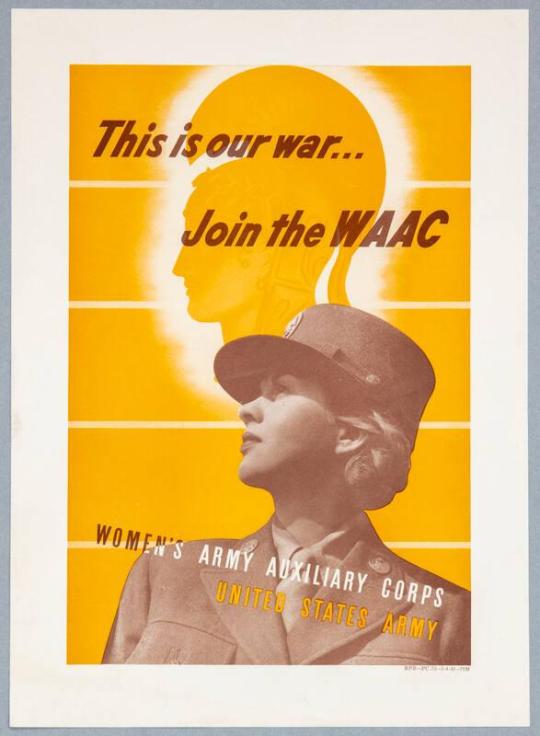
Over 150,000 served in the Women’s Army Corps (WAC/WAAC) in jobs ranging from telephone, radio, and teletype operator to cryptographer, medical technician, sheet metal worker, and aircraft mechanic.
The Navy recruited over 80,000 WAVES (Women Accepted for Volunteer Emergency Service). They worked as clerks, secretaries, cryptologists, air traffic controllers, meteorologists, and translators.
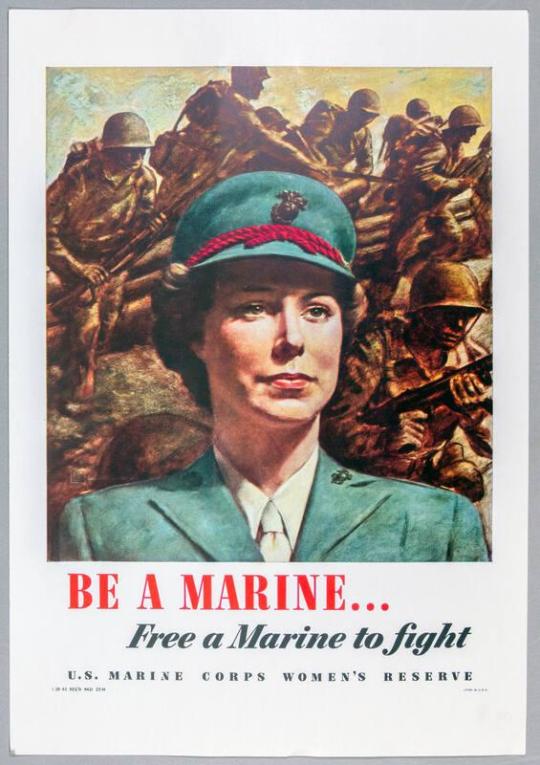
The Marine Corps Women’s Reserve, established in February 1943, enrolled 23,000 women during the war.
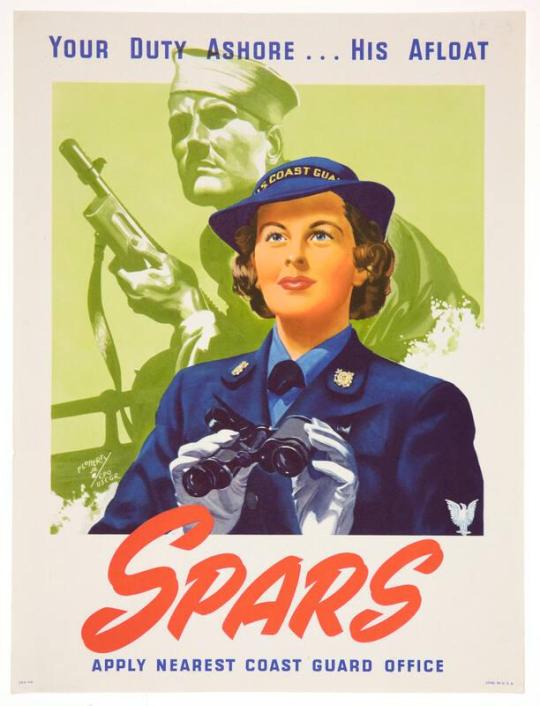
While the Coast Guard Women’s Reserve enlisted more than 10,000 between 1942 and 1946.
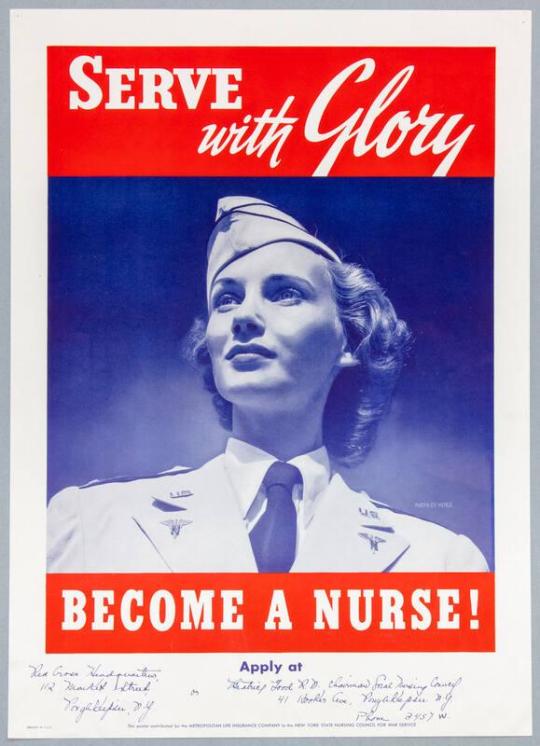
Like some of the wartime posters that encouraged women to the join the industrial workforce, military recruitment posters sometimes offered mixed messages. Prevailing biases regarding gender roles dictated that women not serve in combat roles.
Learn more about this collection: https://fdr.artifacts.archives.gov/advancedsearch/Objects/invno%3AMO%202005.13.17*/images?page=1
Follow along throughout 2024 as we feature more #TheArtOfWar WWII posters from our Digital Artifact Collection.

113 notes
·
View notes
Text
Recently Viewed: Mickey 17
[The following review contains MINOR SPOILERS; YOU HAVE BEEN WARNED!]

Mickey 17 is the most compellingly horrifying dystopian sci-fi satire that I’ve encountered in quite some time. In director Bong Joon-ho’s nightmarish vision of a doomed future, Earth has become so inhospitable that humanity flees to the stars en masse, “volunteering” to colonize distant planets in the hopes of escaping poverty, pollution, and oppression. Life, however, is equally harsh and unforgiving in outer space: synthetic food is strictly rationed in order to maximize the “productive” expenditure of calories; narcissistic, megalomaniacal dictators (like Mark Ruffalo’s cartoonishly repulsive Kenneth Marshall) rule the voyagers under their command with an iron fist, treating their crew as little more than a captive audience for their egocentric political propaganda; and labor is ruthlessly exploited, with workers reduced to disposable cogs in a vast industrial machine that, more often than not, serves no discernible purpose—indeed, the titular protagonist (played across multiple iterations by a deliciously hammy Robert Pattinson) is officially designated as an “Expendable”: whenever he dies on the job, his employers simply print an artificial clone of him (constructed from “recycled organic materials”) and immediately shove him straight back into the meat grinder to repeat the process ad infinitum.
The setting is so pervasively cruel, indifferent, and corrupt, in fact, that its moral decay taints even the film’s most sympathetic characters. Naomi Ackie’s Nasha Barridge, for example, is delightfully complex. She frequently abuses her authority as a security officer (in one early scene, she draws her service pistol on a fellow passenger for the crime of… bullying her boyfriend—dickish behavior, to be sure, but certainly not an offense worthy of summary execution), occasionally indulges in recreational drug use as a means of self-medication (which probably explains her emotional instability—an irresponsible habit for a woman who carries a firearm, as the plot eventually bears out), and enthusiastically embraces the kinky potential of the simultaneous existence of two copies of her lover (dubbed Mickeys 17 and 18 for the sake convenience) without any regard for his feelings on the matter. But she is also a fundamentally decent person: she sincerely adores Mickey, comforting him through his innumerable demises/resurrections and looking out for his wellbeing at her own expense. Ultimately, she’s a hero, despite her superficial flaws; it’s just that nobody can remain completely untarnished in such an inherently toxic environment.

Mickey 17 has a lot to say—about the perversion of institutions of power, about the inherent injustice of corporate greed, about the absurdity of religious zealotry, and about the nature of human consciousness (is each successive reincarnation of Mickey an exact duplicate of his predecessors, or are they all unique individuals, with distinct personalities, ambitions, and “souls?”)—and articulates its central themes with an appropriate degree of clarity (i.e., the total absence of subtlety). What a fascinating (albeit utterly grotesque) universe to briefly visit!
And how discouraging that it already so closely resembles the reality that we currently inhabit…
#Mickey 17#Bong Joon-ho#Bong Joon Ho#Robert Pattinson#Naomi Ackie#science fiction#sci fi#sci-fi#satire#dystopia#film#writing#movie review
15 notes
·
View notes
Text
Olga Lautman at Unmasking Russia:
It has been a long 86 days— and feels like a decade—since Trump returned to power. In that time, I’ve been documenting, day by day, the systematic capture of American institutions and the collapse of democracy in my Trump Tyranny Tracker. Not just the headlines, but patterns. While most of the media remain trapped in a cycle of chasing the latest headlines—tariffs one day, SignalGate the next—I’ve been focused on the patterns. And what appears to be taking shape is far more dangerous as I see strong indications that Trump may be laying the groundwork for a centralized surveillance state. I can’t say that definitively but we do need to pay close attention. At the center of it all is unauthorized DOGE—run by Musk and a team of unvetted operatives, some with deeply troubling histories. His operatives have embedded themselves across the federal government, bypassing standard hiring processes, background checks, and oversight. We were gaslit that DOGE was a project to cut waste, root out fraud, and “modernize” government systems but I have always believed that is a cover story. But cover for what? Yes, part of DOGE’s mission appears to be dismantling federal agencies—but that’s just the surface. What I believe Musk is doing is using DOGE as cover to build a massive data collection and profiling infrastructure—one that will have chilling consequences for dissent, journalism, and democracy itself. They had years to plan for this moment, anticipating Trump’s return to power. And from day one, we saw it—the lightning speed with which they moved, as if the blueprint had been ready all along. And this is not theoretical. It’s already being tested—in plain sight.
Surveillance as Strategy: The Russia Playbook
What Trump and Musk appear to be building looks eerily familiar. In fact, it mirrors something in authoritarian regimes— like Russia and China. One of Putin’s first moves after taking power was to consolidate the Russian state by installing loyalists in every key position—not just politically, but across the entire informational apparatus. Like the Soviet dictators he emulates—and as a former KGB officer—Putin understands that power isn’t just maintained through brute force, but through data, surveillance, and fear.
Russia has always operated as a surveillance state. From the Soviet era to the present day, its internal security services have been fixated on identifying, isolating, and crushing dissent—both within the government and across society. The only thing that’s changed is the sophistication of the tools. Russia’s government databases were merged under the pretext of national security. State contracts were funneled to loyal oligarchs. Surveillance infrastructure became the regime’s central nervous system. This looks to be the blueprint Musk and Trump are now following. Musk’s unvetted operatives—most of them political loyalists with no public service background—have been given access to internal sensitive systems of key U.S. government agencies. These include the Social Security Administration, the Department of the Treasury, the Office of Personnel Management, and, most recently and alarmingly, the IRS. Each holds massive amounts of our sensitive personal data— tax records, income histories, medical information, demographic data, and backgrounds. Individually, these data points reveal a lot. Combined? They offer a total profile—an AI-searchable and cross-referenced system— built to track every American’s financial, personal, and political life.
Testing Grounds: The Federal Workforce
This surveillance apparatus isn’t just being tested on immigrants or international students, it’s being tested on federal workers themselves. According to The Guardian, employees at the Department of Veterans Affairs were warned that their virtual meetings were being secretly recorded—and advised to be cautious about voicing any disagreement with Trump’s decisions. At the State Department, IT staff reportedly began installing monitoring software on employee devices. In response, some staffers—fearing hidden microphones—resorted to blasting white noise or turning on breakroom sinks to muffle their conversations.
At the EPA, a partner water management organization sent out an internal warning that all calls, calendar entries, and meetings with EPA staff were being monitored by an AI tool—one that had appeared, unannounced, as a notetaker in their virtual calls. While the agency denied it, staff say they were explicitly told that DOGE was scanning communications for any signs of “anti-Musk,” “anti-DOGE,” or “anti-Trump” sentiment. At USAID, leadership handpicked by Trump’s White House was reportedly caught reading private group chats. Employees said that their acting administrator—the same person who handled the agency’s IT—abruptly appeared in a group chat of over 40 contractors. The breach was so blatant that staff began abandoning official systems altogether. Eventually, USAID’s website was taken offline without explanation.
The Mass Purge: Chaos by Design
I also believe the ongoing mass purges of federal workers serve multiple functions. First, they create chaos inside the agencies, eroding institutional memory and making it easier to rewrite processes without oversight. Second, they eliminate career officials—many of whom might resist or expose what Musk and his operatives are actually doing behind the scenes. And third, they overwhelm the media with scandalous and likely illegal firings, distracting the public while core government services collapse and the surveillance infrastructure is quietly built in the background. But there’s more. These purges send a chilling message to the rest of the federal workforce: fall in line or you’re next. They’re not just dismantling agencies—they’re replacing public service with loyalty tests. The result is a hollowed-out government filled with fear, silence, and political operatives. And that’s exactly the point. When institutions are weak and morale is broken, authoritarian power consolidates faster. [...]
Targeting International Students and Immigrants: Testing the System
Also, last week, USCIS announced it would begin screening immigrants’ social media accounts for antisemitism, which would be used as grounds to deny visas and green cards. DHS issued a statement declaring: “There is no room in the United States for the rest of the world’s terrorist sympathizers... You are not welcome here.” This isn’t solely about protecting Jewish Americans or Jewish students— who face real threats. Rather, it appears to be an effort to weaponize the issue as a political shield for an anti-immigrant, anti-dissent agenda. Jewish advocacy groups like Bend the Arc quickly condemned the policy, calling it what it is: a smokescreen for cruelty and repression, not a good-faith attempt to combat antisemitism. And this isn’t theoretical. Immigrants are already being disappeared, social media scanned, and green card holders detained. DHS has reportedly requested IRS data on over 7 million immigrants, and ICE is preparing to act on that data.
Olga Lautman has a very frightening yet truthful story about how the Trump/Musk Regime’s use of surveillance as a tool to curb dissent.
#Trump Administration II#DOGE#Authoritarianism#Privacy Act of 1974#Elon Musk#Donald Trump#Olga Lautman
27 notes
·
View notes